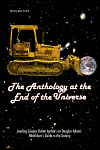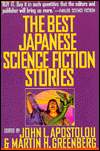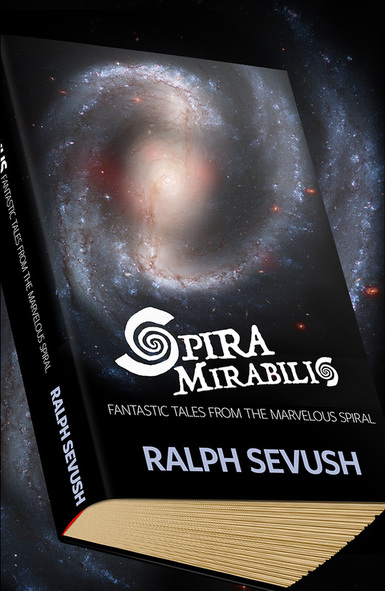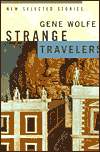
DAW's 30th Anniversary Anthology: Science Fiction, edited by Elizabeth Wollheim, Sheila Gilbert
Book Review by Joshua Palmatier
The Home Front by Brian Stableford: This is kind of an economic story actually, set in the future. The world is being terrorized biologically speaking and we fight back using . . . potatoes. That makes the story sound silly and it's much more serious than that, and in the end the story isn't really about terrorism but how we as humans behave and react to terrorism (especially the biological kind, which can't really be seen). An interesting story.
Aboard the Beatitude by Brian W. Aldiss: OK, I have to admit that I . . . didn't get this story. The Beatitude is a FTL ship and the story seems to be exploring some of the affects that FTL might induce on the crew and such. There are also some ambiguous moral issues brought up, since the crew of the ship needs exorbitant amounts of energy to work and it gets that energy by destroying worlds it passes in its flight, some of which are inhabited. But in the end, I just didn't get the intent behind this story. It's probably just that I'm not the reader it was intended for.
Odd Job #213 by Ron Goulart: This story was simply fun! The idea is that two private investigators are hired by an android cat to find out what happened to its maker. Hilarity ensues in a tongue-in-cheek kind of serious way. However, reading this story I got the impression that the story wasn't really meant for the short form and that it should have been developed more. I would like to have seen this as a novel. (And as an aside, there are books out there now, not by Ron Goulart, that are in the same vein as this story.)
Agamemnon's Run by Robert Sheckley: This was an interesting story about unnamed aliens that get us humans to act out old battles, myths, etc. We're supposed to follow the "history" if we're chosen to be one of the participants, especially the "named" participants, like Agamemnon. But they also like it if we can figure out how to change the outcomes. The idea was interesting, but I'm not sure that the story worked as a whole for me. It felt like it needed a little more development.
Grubber by Neal Barrett, Jr.: This story was incredibly interesting, starting off with an alien creature. We end up experiencing this creatures growth to adulthood, through their rather alien eyes. Because of this, it's a little hard to get into at first, because we're seeing things through those alien eyes, but as you read you settle into the new perspective. A great story, in my opinion.
The Sandman, the Tinman, and the Bettyb by C.J. Cherryh: And this was another great story. It begins with a man (the Sandman) alone on a ship watching a part of space that has little to no action in general. Of course, action ensues. It's not "end of the universe" action—an ancient missile fired eons ago is heading toward a space station—but it doesn't need to be for a short story. The efforts to stop the missile by the people that most of those on the station have forgotten or could care less about is spectacular.
The Big Picture by Timothy Zahn: This was also a good story, about a man on a space station whose friend went "undercover" on the planet below and subsequently vanished. A reporter shows up to find out what happened. An interesting twist in the end, but it's more about the man and his interactions with the reporter that are interesting to me.
A Home for the Old Ones by Frederik Pohl: This story is obviously set in the world the Pohl created for his books, and there are some assumptions that the reader has already had a background in that universe. I haven't read that, but the story was still enjoyable. My only problem with it is that it didn't feel like it ended. I felt like this was a scene or backstory for something that happened in the previous books that those who've read it would be interested in and would see where it "fit" into that universe . . . but for someone like me who hasn't read the previous stuff . . . it just doesn't feel whole.
Not With a Whimper, Either by Tad Williams: An interesting story here that will make you look at your computer and your chat sessions and IMs and boards and such in a different light. I generally like Tad Williams' work and this was no exception. It's written entirely as a chat session on a board between . . . well, geeks . . . and something else. It takes a little while to get used to the format and such, but definitely an enjoyable read.
The Black Wall of Jerusalem by Ian Watson: This one got off to a rocky start for me. The first few sections were just confusing and I couldn't get into the story. But then it settled and I found myself wondering about this Black Wall and such. The group and the main character of the story ended up being much more interesting than I'd originally thought, and the idea behind the Black Wall also intriguing. I felt there could be more done with this Wall . . . and what was behind it.
Station Ganymede by Charles L. Harness: This story was instantly engaging, with a father and son conflict being played out on a station investigating and doing research over Jupiter. The science was interesting, if a little "soft" in some aspects. The action was predictable (I could see the shape of the story once the key element was introduced) but it was still highly enjoyable. And the relationship changes in the two main characters were perfect, I thought.
Downtime by C.S. Friedman: An intensely interesting story, with an idea regarding where our near future society could be going with some of our technology that's both subtly horrifying and instantly controversial. I like the fact that C.S. Friedman presents us with both sides of the controversy and idea and, in the end, doesn't leave us with a nice solid "answer" to the problem. You can see both sides of the human element to the science—why some would hate and fear the technology and the laws that surround it, and others (those on the receiving end) would . . . well, at least appreciate it. I can see this as something our society may have to contend with shortly. Although I'm not sure that the laws in the story that arise around the technology would actually get passed by us. I guess we'll see, won't we?
Burning Bridges by Charles Ingrid: This story takes us to a new world and culture and is really a kind of spy/action story, the main character attempting to clear a blood debt, although he's being forced into it by some rather nasty individuals. The real question is who's playing who, and who really has the upper hand. Based on the intro, this is set in a world that readers of Charles Ingrid will recognize. Perhaps they'd recognize the main character as well. I haven't read any of Charles Ingrid's novels, so this was a brand new world for me, and I found it intriguing. In fact, when I finished, I announced to the world in general that, "I think I'll have to get some of Charles Ingrid's books." *grin* I'd certainly like to learn more about this world.
Words by Cheryl J. Franklin: I've never read anything by Cheryl J. Franklin, although I think I have one of her books on my TBR stack. So this was my first introduction to her writing. This is a story about an unsocial security systems specialist who helps out the police and on one particular case she is forced to be a little more social than normal when she takes in the victim's cat. It's a nice story with a rather uneasy commentary on how we view our own pets . . . and perhaps how they view us.
Read Only Memory by eluki bes shahar: I've never read anything by this author either and by the intro it seems this story is an introduction to the world she uses in her books. Some of the references I didn't get, but the story itself was easy to follow. Essentially, the main character is drawn into middle of a dangerous game of power and archeology over an artifact called a Library. But the books in this Library aren't what they seem . . . and neither is the main character.
Sunseeker by Kate Elliott: This story is set in the Jaran universe, although it's set on Earth. The base story is about a solar ship called the Sunseeker and the group of spoiled young adults from various wealthy families that travel around in it for promotional purposes for the solar array that powers it. But when the ship lands to see an archeological site, it's attacked. But the REAL story is about one of the young adults and her relationship with her father.
The Heavens Fall by S. Andrew Swann: This is a rather interesting story about a form of punishment called "empathy treatment" that, in the near future, is used to punish convicted criminals. The idea is to force them to relive their victim's last moments as if they were the victim themselves. Of course, this punishment has some flaws and in this particular story goes horribly wrong. A nice cautionary tale about a seemingly simple and "harmless" technology and how it could be misused.
Passage to Shola by Lisanne Norman: I've never read anything by Lisanne Norman and this story introduces you to her world. The main characters are actually aliens here, with Humans being a minority species, with the ability to psychically bond to other alien species. In this story, a bonded Human and alien at the teen age are being transported to a new city by the main character . . . and things go horribly wrong when their ship is hijacked by a vicious — and hungry — alien.
Prism by Julie E. Czerneda: This is another story in which the main character is an alien so far removed from human that, at times, it can be hard to understand and follow her. Julie E. Czerneda is very good at getting across the alien-ness though, probably because of her biological background. Here, we meet two bizarre alien creatures, although the real story is about one of the creatures growing from childhood to the beginnings of adulthood.
Overall, I thought this anthology was stronger than the companion fantasy anthology I've already reviewed. I've bolded the two titles that I thought were the strongest in this anthology, but I have to say that nearly all of the stories were interesting and well written. One of the strongest of the DAW anthologies I've read so far.
|
Click here to buy DAW's 30th Anniversary Anthology: Science Fiction, edited by Elizabeth Wollheim, Sheila Gilbert on Amazon
|
DAW's 30th Anniversary Anthology: Science Fiction, edited by Elizabeth Wollheim, Sheila Gilbert on Amazon

| More Books You Might Like |
| Comments on DAW's 30th Anniversary Anthology: Science Fiction, edited by Elizabeth Wollheim, Sheila Gilbert |
| There are no comments on this book. |



